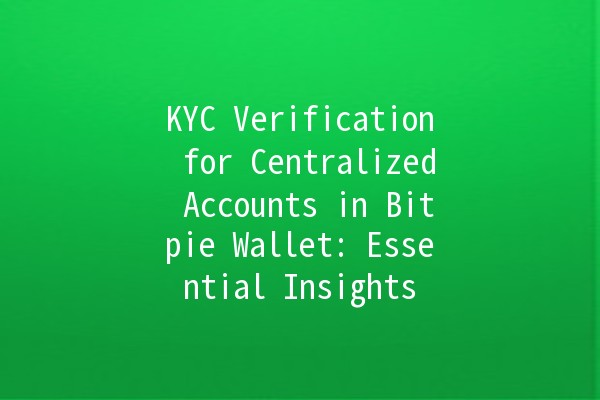
In the rapidly evolving world of cryptocurrency, security and compliance have become paramount, particularly as regulations tighten. A key aspect of ensuring a secure trading environment is the Know Your Customer (KYC) process. The Bitpie Wallet, a prominent cryptocurrency wallet, employs KYC verification for its centralized accounts. This article explores the importance of KYC in protecting your assets, discusses the verification process, and offers actionable insights to optimize your cryptocurrency experience.
Understanding KYC and Its Importance
KYC, or Know Your Customer, refers to the process through which financial institutions and organizations verify the identity of their clients to prevent fraud, money laundering, and other illicit activities. By implementing KYC, platforms like Bitpie Wallet ensure transparency and compliance with regulatory standards, which boosts users’ trust and safety in the ecosystem.
Why KYC Matters:

How KYC Works in Bitpie Wallet
Bitpie Wallet employs a straightforward KYC verification process aimed at maintaining ease of use while ensuring security. Here’s how it typically works:
A governmentissued ID (passport, driver’s license).
Proof of residence (utility bill, bank statement).
Tips to Optimize Your KYC Experience in Bitpie Wallet
Before starting the KYC process, ensure you have all necessary documents ready. This can include various forms of identification and proof of residence. Keeping these documents organized can significantly speed up the verification process.
Example: Create a folder on your device labeled "KYC Documents" and store scanned copies of your ID and proof of address there for quick access.
When submitting documents, ensure that you upload highresolution images or scans. Blurry or poorly lit images may lead to delays or rejections in the verification process.
Example: Utilize a scanner or a welllit area to take pictures of your documents, ensuring all text is clear and legible.
While filling out the registration form, ensure that all information matches what is on your documents. Any discrepancies can lead to unnecessary delays.
Example: If your ID shows “John Doe,” make sure the name you enter isn’t mistakenly written as “Jon Doe” or any variation.
Cryptocurrency regulations are constantly evolving. By staying up to date with changes, you can ensure your KYC information remains compliant.
Example: Follow cryptocurrency news channels and updates from Bitpie to know about any new requirements or changes in KYC processes.
If you face issues during the KYC process, don’t hesitate to reach out to Bitpie's customer support. They can provide assistance and guidance to help you through the verification.
Example: If your KYC documents are rejected, contact support to understand the reason and what steps you need to take next.
Key Takeaways from the KYC Process in Bitpie Wallet
KYC verification is a critical step for utilizing centralized accounts in Bitpie Wallet. By completing this process, users can enjoy enhanced security and trust within the cryptocurrency ecosystem.
Moreover, the tips outlined above can help streamline your KYC experience, allowing you to focus on trading and managing your assets rather than administrative hurdles.
Common Questions About KYC Verification in Bitpie Wallet
For KYC verification in Bitpie Wallet, users typically need to provide:
A governmentissued photo ID (e.g., passport or driver’s license).
A proof of residency that includes your name and address (e.g., utility bill or bank statement).
This documentation helps ensure compliance with regulatory requirements while protecting user identities.
The KYC verification process can vary based on several factors, including the volume of applications received. Generally, Bitpie aims to process verifications within a few hours to a couple of days. Users will be notified once their status is confirmed.
If your KYC verification fails, Bitpie will typically notify you of the reason behind the decision. Common issues include unclear images, mismatched information, or failure to submit required documents. It is essential to address these promptly to ensure a successful verification on your next attempt.
While it is possible to create an account on Bitpie Wallet without completing KYC, numerous features will be restricted. For instance, users may encounter limits on withdrawals and trade functionalities. Completing KYC is necessary to unlock the full potential of your Bitpie Wallet.
Yes, Bitpie Wallet is dedicated to maintaining user privacy and security. Implementing advanced security measures ensures that your personal information is protected against unauthorized access or breaches. Nonetheless, users should always take precautions by using strong passwords and activating twofactor authentication.
Failure to complete the KYC process can lead to significant limitations on your account. This includes restricted access to certain features and potential inability to withdraw funds. Additionally, noncompliance may result in account suspension or closure.
By engaging in KYC verification, you actively participate in fostering a secure and compliant cryptocurrency environment.
s on Cryptocurrency Security
KYC is just one layer of security in the cryptocurrency landscape. Here are other measures users should consider:
Enable TwoFactor Authentication: An extra layer of security that requires not just a password but also a verification code sent to your mobile.
Utilize Cold Wallets for Storage: For longterm storage of assets, consider using hardware wallets which are less susceptible to hacking.
Regularly Update Software: Ensure that your wallet and related applications are always up to date to protect against vulnerabilities.
KYC verification in Bitpie Wallet is an essential step for users looking to engage fully within the platform’s cryptocurrency ecosystem. By understanding the importance of KYC, preparing the necessary documents, and employing the tips outlined, users can ensure a smooth experience. Staying informed about compliance and security is crucial in navigating the complexities of cryptocurrency trading.
In this everevolving landscape, knowledge and proactive engagement can lead to improved security and user trust, ultimately enhancing the overall cryptocurrency experience.

